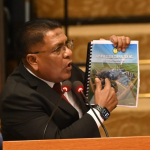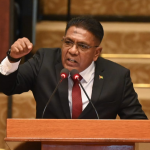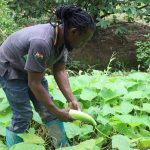– more block drain structures to be constructed
– flood-affected farmers to receive planting materials, fertiliser, other forms of assistance
Farmers from communities along the Pomeroon River in Region Two, will soon benefit from an improved drainage and irrigation system, with the passage of the national budget, which is expected to be presented in the National Assembly sometime next month.
Earlier today, Agriculture Minister, Zulfikar Mustapha and a team of senior officers from the ministry, hosted two community meetings with farmers to discuss and bring some amount of relief to the issues they are facing.
During the first meeting, which was held at the Jacklow Primary School, Minister Mustapha disclosed that the National Drainage and Irrigation Authority (NDIA) is hoping to procure a pontoon, fitted with two excavators, to carry out works in the communities along the Pomeroon River.
Several of the farmers and residents who attended the meeting said there was an urgent need for works to be carried out on a number of the drainage canals in the Region. The farmers also said that more block drain structures needed to be installed along those riverine communities.
Shaik Yussuf, a farmer from Jacklow, said that farmers needed planting materials to be able to return to their farms after most of their crops were damaged due to the recent instances of prolonged flooding in the Region.

“As you know the flood water now is presently receding and now we’re seeing what the losses are. I have a concern about the planting material. If these prices for the planting materials can be reduced to a lower cost so that farmers can be able to purchase these planting materials. Secondly, I am appealing for some sort of assistance for farmers in the form of giving fertiliser so as to help the farms with the produce. My other concern is, we have a block drainage at the back and it is presently clogged up. It needs reconditioning so that we can be able to get back on our farm because, I think, that was one of the main causes of the flood that affected us. My next concern is about these plastic tube kokars that are being given to certain persons. I applied since 2015. The first time I spoke to the engineer, he told me that my name was on the list. The next time I spoke to him he said that my name was striked off. So, these are things that are really bothering some of us,” Mr. Yussuf said.
Minister Mustapha told the farmers that his ministry had submitted a proposal for the purchase of a pontoon and two excavators to carry out continuous works in the Pomeroon region. He also said that, after the 2021 budget is passed, the NDIA would be able to recommence its block tube registration and distribution exercise.

“You know now we are preparing for budget. We have already submitted to the Ministry of Finance our proposal. I want to tell you that we’ve included sums to purchase a pontoon with two excavators for the Pomeroon River. As long as we get that, it will remain in the Pomeroon. I am optimistic that we will have those funds approved. When we are crafting our budget estimates, we’ll look at various vulnerable areas but we decided that we should include those critical pieces of equipment in our budget proposal. In relation to the drainage system, I know for a fact that, when we were in government prior to 2015, we did a number of those block drainage structures. We also distributed block tubes to help farmers. I’ve instructed NDIA to recommence that programme. That programme, however, cannot start until after the budget has passed. From Monday, officers from the NDIA will come into the area to do an assessment. I want to assure you that we will try, as much as possible, to facilitate as many requests for these structures,” Minister Mustapha said.
Dexter Cameron, a farmer from Marlborough, said that the small farmers in the community were experiencing issues with intermediate drainage and could not afford to do much on their own.

“My concern is about drainage in the Pomeroon. Agriculture is a big business and everyone may not be able to excel in certain areas. We know that big farmers can do certain things but the smaller farmers would like to exist also. My concern is that we all can’t reach at top, but there’s a level where we can all exist. The smaller farmers, and they are many, are having a problem with intermediate drainage. The government has been doing a very good job. We’ve had our canals dug and they are being maintained and work is going on. The river defense programme is going on. The sea dam and the river dams are being built but there’s a struggle within the farms themselves. That’s where we need some assistance. Pomeroon is a low land and we cannot blame the government when the rain falls but we can ask for help to deal with this problem,” Mr. Cameron said.
Brian Ali, a well-known farmer from Marlborough, spoke about the condition of the mouth of the Pomeroon River. He also asked for assistance with chemicals in cultivating coconut.
“If we are thinking long term, because farming, especially coconut farming is about to take off to go a very high place…the major concern, where drainage is concern, is the dredging of the Pomeroon River. In 2005 I did raise this issue and some persons objected to it. If we are in a basin and the mouth of the river is shallow, only a certain amount of water could pass out there. People are suggesting that we dig more canals to the river but it would be the same thing if the rain falls because the mouth of the river is shallow. It needs dredging. My other concern is, at one point we were receiving chemicals for the coconut industry. I would ask today if that process could continue. Today we have cases of infestation of the red palm mite and recently, I’ve seen the coconut cockle. The chemicals that we use would also help to alleviate that very cockle infestation,” Mr. Ali said.

In responding to the farmers’ comments, Minister Mustapha said the Ministry did discuss carrying out works at the mouth of the Pomeroon River.
“When I visited flood affected areas in Charity a few weeks ago with the Prime Minister, that issue was raised. I asked NDIA to do an estimate of the cost to execute that project. It would cost the government billions of dollars. We have to work over time between the Ministry of Public Works and the Ministry of Agriculture. I will let my colleague Minister know that there is serious concern from residents in the Pomeroon about the clearing of the river mouth,” Minister Mustapha said.
Over the past few weeks, several communities along the Pomeroon River had experienced severe flooding as a result of constant rainfall and the overtopping of the Pomeroon River, leaving almost 150 households severely affected.
Since then, the Ministry of Agriculture has put measures in place to bring some amount of relief to farmers who suffered losses as a result of the flooding. The National Agriculture Research and Extension Institute (NAREI) and the Guyana Livestock Development Authority (GLDA) have commenced a series of assessments to see how many farmers were affected and the extent of the damage.
Minister Mustapha said that, based on the findings of those assessments, farmers will be given assistance in the form of planting materials, fertilisers and other chemicals so that they can return to their cultivation. These assessments, he said, will commence within the coming days. He assured farmers that, they too, would benefit from the same level of assistance farmers along the Coast and other parts of the country, who were affected by flooding, had received.






